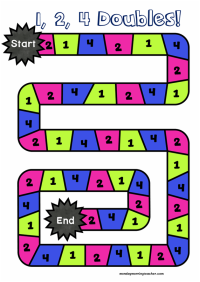
In maths, we'll be starting to look at multiplication and division. I'll have my class do a pre-assessment tomorrow, to find out exactly what they do and don't know. However, I'm pretty sure I'll find a range of different levels of understanding of multiplication (I know that at least a couple of kids already know all of their times tables to 10), so I've made a set of differentiated game boards for us to start off with this week.
Kids seem to pick up doubles fairly easily - most of my class know their doubles to 20, and many can double beyond 20 relatively easily (we work on this skill each morning as part of our morning administration routine - we double the number of children having school dinners each day). The doubles strategy in multiplication builds on the doubling skills that the kids already have. The 4 times table just doubles the answers in the 2 times table (and 8 doubles 4, 16 doubles 8, etc).
The games I've made start at an easy level (the one shown above), to help support my kiddos who find maths a bit trickier. There is also a game board using the 2, 4 and 8 tables, as well as a challenge board using the 4, 8 and 16 tables. Each board has its own small 'multiplication grid' answer card, so kids can check their answers as they go (and they aren't practising the wrong sums!).
You can click on the picture above or here to download your copy of these games.
The game is played very easily. Each player takes a turn rolling the die. They then move their counter that many spaces. If they have rolled a '3' and land on the '4', they multiply those 2 numbers together. If they answer '12' correctly, they remain on that space. If they answer incorrectly, they go back to their previous space (you can obviously modify this rule, if you want - so children could go back 1 space, etc for a wrong answer). I find that it helps to have a small penalty for a wrong answer - that is usually enough incentive for the playing partners to not let each other cheat, by looking at the answer grid before answering their question!
I'll be using this game in conjunction with doing number talks that focus on this doubling strategy. So I'll also be modelling for the kids how to use mathematical language to explain how they got each answer (e.g., 'I know that 3 x 2 = 6, so I know that 3 x 4 is double 6, or 12').
Hope your first week back goes well. If you are starting to look at multiplication as well, and are able to use this game, I'd love to hear from you about any modifications you make or how your kids like it.

 RSS Feed
RSS Feed